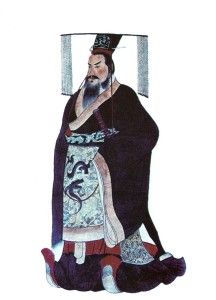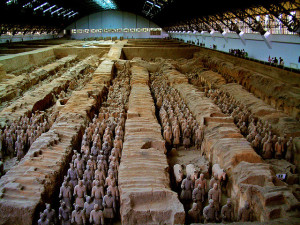Perhaps no figure in history feared death as openly as China’s first emperor, Qin Shi Huang. Death was so terrifying to him that he might have actually killed himself in an effort to beat it.
What would you do to ensure you were immortal? For this emperor, it meant swallowing dozens of mercury pills, slaughtering an entire village and constructing a full, life-sized army out of terracotta.
From the start, Qin Shi Huang was a fierce ruler. He came into power in 220 BC, and managed to unite China after decades of brutal war and division. He constructed roads, made plans for The Great Wall of China and standardized the country into a single cultural identity. He was also known for his cruelty, executing scholars who criticized his ideas.
Despite his crippling terror of death later in life, the emperor had some fantastic luck as a young man in his many brushes with death. As he slowly gained power, he had no less than three assassination attempts thwarted.
The first time someone tried to kill him, a man brought him a gift that turned out to be a severed head and a dagger. As the man tried to stab Qin Shi Huang (whose personal name was Ying Zheng), he missed the emperor multiple times. The emperor pulled his own sword from its sheath and stabbed the would-be assassin eight times.
The second time someone tried to kill Ying Zheng, the attempted assassin used a lute. A musician Zheng had hired to perform for him turned out to be close friends with the man who tried to kill him with the dagger the first time around. The musician brought a heavy, lead-laden lute to the performance, attempting to bash Zheng on the head with it. When he, too, missed, Zheng had him executed.
As Ying Zheng’s carriage rolled along a mountain trail, the strongman tossed the metal into the carriage, completely shattering it into pieces.
The third time someone tried to kill him, a wealthy aristocrat from the Han state hired a strongman to literally throw a giant cone of metal on top of the emperor’s carriage. As Ying Zheng’s carriage rolled along a mountain trail, the strongman tossed the metal into the carriage, completely shattering it into pieces. Luckily for Zheng, it turns out that this was not the emperor’s carriage, since he always traveled with an identical double. He had escaped death again.
It’s probably no wonder that someone with this history would be so horrified by the idea of dying. When almost everyone wants to personally kill you, preventative measures become a necessity.
A meteor hit Dōngjùn in 211 BC, and its arrival caused some villagers to spread a rumor about the emperor’s defeat. They saw the meteor as the sign of a prophecy, which stated that Emperor Ying Zheng would soon die, and that the states of China will once more be divided.
Not taking any chances, Zheng had the entire population in the area executed, being unable to find the person who started the rumor.
In a twist of fate, Zheng became obsessed with miracle cures and an elixir of life. He was convinced that he could unlock the door to immortality.
In a twist of fate, Zheng became obsessed with miracle cures and an elixir of life. He was convinced that he could unlock the door to immortality. He began taking pure mercury pills in an effort to defy death. He only succeeded in shuffling off this mortal coil prematurely in 210 BC, when the high dose of mercury killed him. It was about one year after he heard the prophecy and became obsessed with his own death.
That’s where the terracotta army comes into the picture. Zheng and his close associates believed that the emperor would need an army in the afterlife, in the event his elixir of life failed him. They built 8,000 soldiers, 130 chariots and 670 horses out of terracotta to help protect the emperor from rival armies in the afterlife. The project took immense manpower to complete, but it was only just discovered in 1974. Construction on the mausoleum housing the soldiers began when the emperor was just 13 years old, long before he had taken on serious power. As the tomb grew, so did Zheng’s fear of death.
As impressive as it is to see thousands of life-sized, fully detailed sculptures in this mausoleum, it is important to remember why they exist. This wasn’t for the sake of art; this was a sacred form of protection, and the culmination of a life lived in fear of death. These immortal soldiers are reminders that time catches up with all of us eventually.

 Fear of Death and a Terracotta Army
Fear of Death and a Terracotta Army





 “Help Me, Helen”
“Help Me, Helen”
 Recovering Cremation Remains After the Los Angeles Fires
Recovering Cremation Remains After the Los Angeles Fires
 “As Tears Go By” by Marianne Faithfull
“As Tears Go By” by Marianne Faithfull














